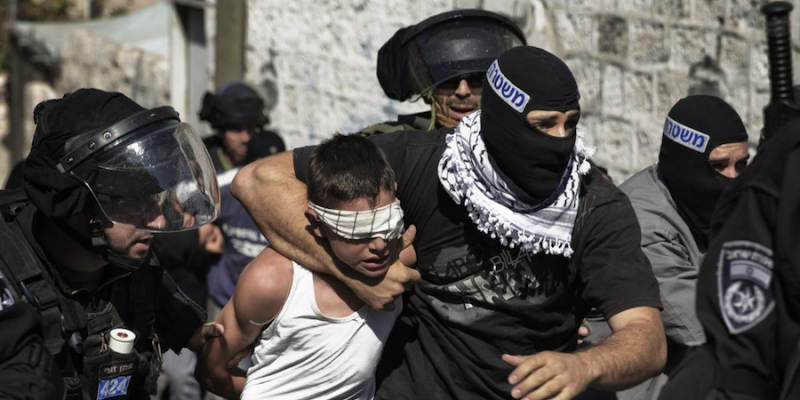Israeli forces are disproportionately incarcerating Palestinian children in occupied Jerusalem, says documentary short film by Addameer Prisoner Support and Human Rights Association.
~Louisa Emslie, Alternative Information Center (AIC)
Addameer Prisoner Support and Human Rights Association recently released a documentary short film, produced by Odeh Film, titled, “Precarious Childhood: Arrests of Jerusalemite Children.”
The video depicts the lives of several Jerusalemite families whose children are taken by force, arrested and imprisoned by Israel. The children narrate their experiences of arrest, interrogation, and treatment by Israeli forces.
Addameer is a Palestinian civil society institution established in 1992 that provides free legal aid for Palestinian prisoners, advocates for their rights and aims to prevent human right violations.
Children are not spared from Israeli occupation
Addameer Advocacy Officer Laith Abu Zayad explained to the Alternative Information Center that the film is, first and foremost, an effort to “push the Israeli government to protect children’s rights.”
The organization determined that since the al-Quds Intifada began in October 2015, the number of Palestinian children under the age of 18, in Israeli prisons, has more than doubled to 350 child prisoners.
In 2016, Israeli forces detained 560 children from occupied East Jerusalem alone, 110 of whom remain in prison and constitute 30 percent of all incarcerated Palestinian minors.
The number of detained children in Jerusalem is increasing at a faster rate than children from the West Bank and Gaza, due the pervasive presence of Israeli forces in the occupied city.
Israel classifies Palestinian children as “security” or “criminal” offenders, under Israeli law, rather than “protected persons,” as mandated by international law.
During these arrests, Israeli forces violate the law and rights of Palestinian children by, for example, interrogating them without the presence of parents or a lawyer, denying family visitation, and even subjecting them to torture.
Incarcerating Palestinian children becomes policy
At the same time, as Israeli authorities ratchet up the incarceration of young Palestinian Jerusalemites, they ensure the vitality of the practice by passing new policy.
The ‘Youth Bill,’ passed in November 2015, stipulates that Israeli forces are obliged to institute minimum sentences for children involved in stone throwing activities. It also rules that a child under 14 should be imprisoned for murder, if he or she attempted the crime with “nationalist motives.”
The extension of administrative detainee status to children is another cause for action, a practice Israel revived while arresting Palestinians for Facebook posts that allegedly “incite to violence.”
Administrative detention allows for indefinite imprisonment without trial or charge, based on “secret evidence” supplied by Israeli intelligence forces.
Israel stopped placing children in administrative detention between 2011 and 2015. However, since the October 2015 Intifada, there have been 19 Palestinian child administrative detainees. Five remain in prison, according to Addameer.
Solidarity without borders
But, the “Precarious Childhood” campaign hopes to convey a message to locals, too. “There is not enough awareness in the West Bank about the situation in Jerusalem,” said Laith.
Laith attributes the disconnection to the physical and political separation between the two areas that is violently imposed by the Israeli occupation.
Addameer also sees its campaign as an appeal to the international community to overcome its “lack of will” and challenge Israeli policies that violate Palestinian rights.
The European Union and United Nations are included in this camp. Laith explains they have proven “hesitant to speak out against Israel publicly” or pass policies that would meaningfully “hold Israel accountable for its crimes.”
Consequently, the organization urges Palestinian rights defenders to look past Europe and raise awareness in countries such as Latin America, Africa and Asia, too.
After all, the need for action is urgent. As noted by Addameer field researcher Salah Hammouri in “Precarious Childhood,” unless “political, social and economic conditions” change, “difficult conditions await children in Jerusalem.”
Louisa Emslie is a graduate from the University of Edinburgh where she studied Arabic and Spanish Studies. She lives and works in Ramallah, Palestine.

